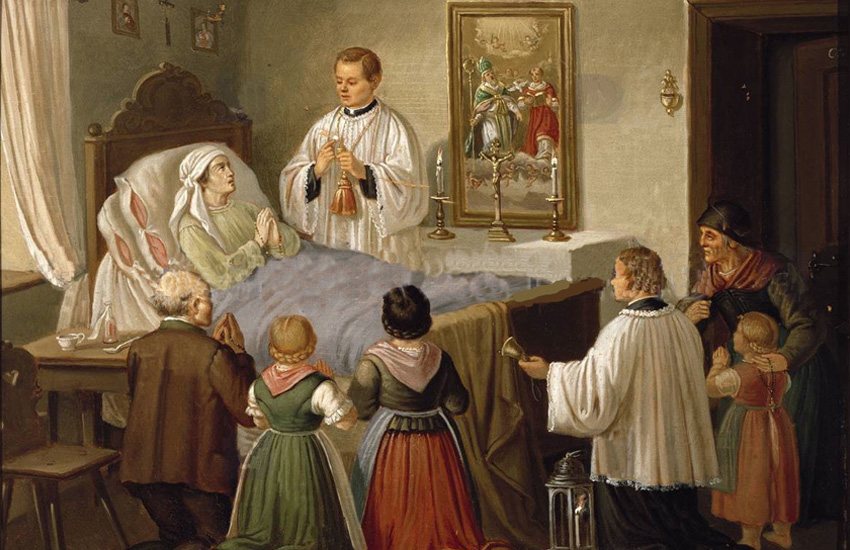
In this time of pestilence (the Coronavirus aka Covid19), Catholics have been left wondering the best course of action and whether or not the sacraments will be available for their spiritual path. In the past several days, I have addressed many of the sacraments of the Church and I did a thorough explanation of whether or not particular sacraments ought to be offered in a general sense. If you haven't already, I recommend (of course I do) you take a look at those if you would like.
In terms of one's spiritual journey, no time could be more important than right before death. Our Catholic faith teaches that God is merciful and that a repentant sinner can be heaven-bound even if he confesses his sins at the last possible opportunity. Of course, there are conditions. It has to be a legitimate confession and contrition and determination to avoid those sins in the future. Also, according to our faith, depending on one's spiritual growth, upon death a person may require some purgation, or cleansing, of his soul which takes place in Purgatory.
In order to make the mercy of God as available as possible, one of the sacraments of the Church is extreme unction, also known as last rites. These involve the sacrament of penance wherein a dying person confesses his sins, prayers said for the person's soul, anointing of that person, and finally the reception of Holy Eucharist. The term "extreme unction" comes from the fact that unction is another word for the anointing oil, and it is "extreme" as in it is at one extreme (the end) of someone's life.
In the case of the dying person, if the Eucharist is their last on Earth, it goes by the name "viaticum" which comes from the Latin for "provision for the journey", which is exactly what it is. It is seen as the body, blood, soul, and divinity of Jesus Christ administered to a dying person which will accompany him into his life with Jesus Christ in heaven.
A person can theoretically receive the sacrament of last rites more than once, however, correctly understood, the sacrament is not meant to be generalized for people who are not in danger of death but are instead ill. The sacrament can be used for people who are mortally wounded (such as in battle), scheduled to be executed, or who are terminally ill and their death is imminent.
So, should the last rites be made available for the faithful during the outbreak of a viral contagion? I believe, if at all possible, that it should be. A person's eternal soul is something of great value. Eternity is forever and we cannot risk to have someone perish without the sacrament of confession. On top of that, they receive many graces and blessings from the ceremony of the last rites.
I believe there are many precautions a priest can take to protect himself while administering this most precious sacrament to a dying person. First of all, it is really only between the priest and the dying person. There does not need to be a large crowd surrounding the priest while he performs the ceremony. So people should maintain a safe distance away from the priest while he is giving the sacrament.
Secondly, the priest can use some personal safety procedures such as using a mask and/or gloves. Although this may not be ideal, given the circumstances, I believe it warranted. Plus, the efficaciousness of the sacrament is not affected by the presence of gloves or a mask. Therefore, there is no good reason to forgo these things.
Unless someone can bring up a valid reason as to why this should be allowed to occur, I believe every provision should be made to accommodate people in this extremely important time in their lives. With correct procedure, most pitfalls can be avoided, in my opinion.
I have been listening to an audio series on St. Charles Borromeo during an outbreak of the plague in the 1570s. He showed extraordinary courage in providing the sacraments to those afflicted by the plague at that time. He showed no regard for his own bodily safety and put himself at risk so that others could partake most fully in the grace that comes from Christ's sacrifice.
To illustrate the heroic virtue of St. Charles and his followers, in a book there is a powerful example of a man wishing to partake of Viaticum prior to death and what a priest did to make this a reality. Here is the excerpt (from the book Life of Saint Charles Borromeo
By John Peter Giussano, Aeterna Press):
A noble action which occurred at this time is worthy of record. The dead bodies carried out from the hospital of St. Gregory during the night were thrown into a public burying-ground adjoining, called the Foppone, in order to be ready for interment the following morning. On one occasion a poor wretch, not quite dead, had been cast out with the rest amidst a heap of putrefying bodies. Early in the morning the priest of St. Gregory's was passing that way to take the Holy Viaticum to some dying persons. At the sound of the bell, the poor creature raised himself upon his knees amidst the heaps of corpses, and turning towards the priest, exclaimed, "0 my father, for the love of God suffer me to receive the Holy Sacrament once more!" The priest did not hesitate for a moment but hastened to give the poor man the consolation he so ardently desired. After receiving his Saviour he laid himself down again, and a few minutes later he was called away with every reason to hope for a favourable judgment from Him with Whom he had united himself on earth. This action edifying in the dying man for his longing for the Bread of Angels, and in the priest for his charity amid so many plague-stricken corpses, was told from mouth to mouth and thought worthy of record by St. Charles himself in his little book called "A Remembrance for his Beloved People."
To hear the full story, please go here and there is a multi-part series on Youtube.
Thank you for joining me with my exploration of this topic. Please feel free to add a comment below, it would really help me out. If you completely disagree, that's fine! Discussion is welcome. God bless.



